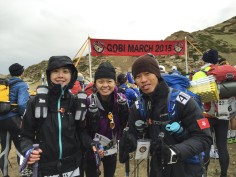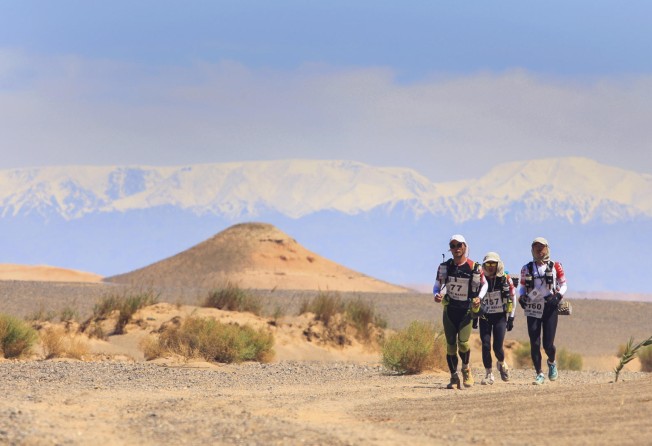
Ultramarathon helps Hong Kong drug addicts turn their lives around
A race across the Gobi desert helped two members of a drug rehabilitation school gain new motivation

Edwin Chung Tak-li doesn't have the luxury of going for a run whenever he pleases. As a student at drug rehabilitation school Christian Zheng Sheng Association, he can't leave without permission. But that didn't deter him from signing up last year for one of the most difficult races on the planet.
The Gobi March is an annual 250km six-stage ultramarathon in China's remote northwestern province of Xinjiang. Participants travel by foot for around 40km a day plus a "long day" of 80km. They must carry all their essential items, including a sleeping bag.
Macy Wong Mei-sze, 32, a graduate of the school who has returned to work as a student warden, joined him. They hoped to bring in much-needed funding for the school.
Determined, the duo trained for a year by running around the school's concrete track. "The whole loop is just under 1.5km," says 23-year-old Chung. "Several times a week, I carried bags of sand and ran the loops for hours."
Once, they ran around the track for 10 hours straight.

"Before I signed up, I was worried about the lack of training facilities to prepare, but running has given me confidence," says Chung, who hopes to save money for further education after graduating this month.
"When I first heard about the race it seemed very remote and formidable - I wasn't sure if I could finish. But I really wanted to try, for myself and for the school," adds Wong.
Last month, they finally completed the unimaginable, finishing the week-long race in just under 60 hours.
Leading the team during the week was seasoned ultramarathoner Agnes Cheng, head of strategy for the Esquel-Y.L. Yang Education Foundation that donated the two race spots for Wong and Chung. She oversaw the pair's training, and accompanied them on local races which they had permission to attend.
"To be honest, at the beginning I wasn't sure they knew what they had got themselves into; they didn't have much confidence. But they had the right attitude, and were very determined and disciplined from day one," Cheng says.
Even the best mindset, however, couldn't have prepared them for what they encountered. The week started with snowstorms, peaked with a heatwave and finished with a sandstorm, cutting short the race. "It was the worst conditions they'd ever had for that race - it was certainly the most difficult race I have done," says Cheng, who's taken part in three such desert races.
Despite the harrowing conditions, the pair say they never thought of quitting.
"It was not an option," says Wong. They credit Christian Zheng Sheng Association for changing their lives. Wong was a drug user, convicted of drug trafficking in her teenage years, while Chung had turned to petty crime and the triads while living with his alcoholic father. Both chose to attend the college, the only rehabilitation school in Hong Kong that allows juvenile delinquents to also receive an education.
While the school saved their souls, the year-long training and final desert has elevated their spirits.
"We have seen them grow in terms of character, perseverance and better understanding of their strengths and weaknesses, and how to make best use of them," says headmaster and founder of the school Chan Siu-cheuk.
"I definitely learned both good and bad things about myself during the week," says Chung, who found the freezing snowstorm on the first day the most difficult to deal with.
As they had packed lightly to reduce their load, they didn't have enough clothes to keep warm. "But it was also one of my best memories - our team of three supported each other through those tough times, we experienced a snowstorm, rainstorm and sandstorm, all within a week.
"I think young people like myself can find a great sense of motivation through sports and build better characters."
Wong says the event "changed her life" for a second time. She will take her experiences back to the students and their weekly running club. "I feel very motivated now. The students and I started training as a bigger group and since then many more students have participated in trail and road races in Hong Kong."
"Macy and Edwin are different people now," says Cheng. "They've seen the world, expanded their horizons and met inspiring people.
"They've had the opportunity to test their body and their mental strength. It's a tough challenge, but they now understand that if they put in the effort and dedicate their mind and heart, they can do anything."